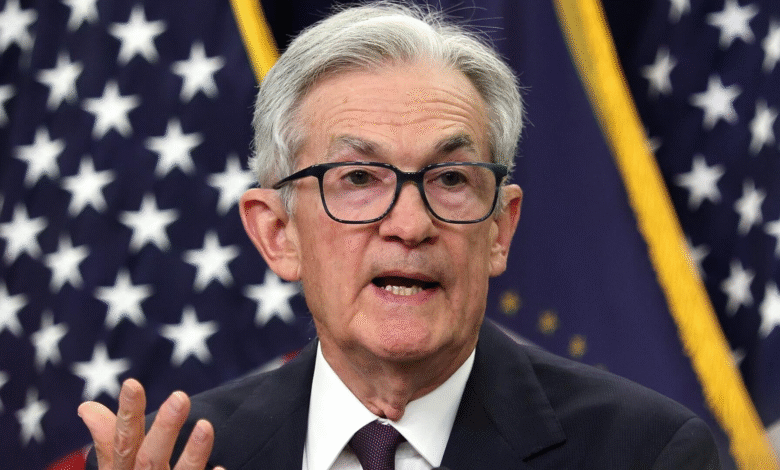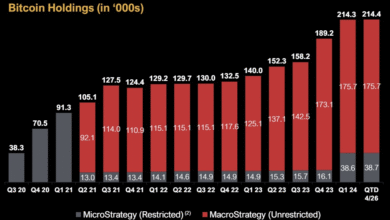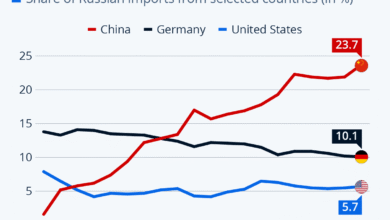Jerome Powell Faces Threat from Trump’s Potential Successor

Jerome Powell, the current Chair of the Federal Reserve, finds himself at a pivotal crossroads as whispers of President Donald Trump appointing a successor circulate. This speculation has given rise to concerns about the potential emergence of a ‘shadow chair’—an individual who could undermine Powell’s authority until the end of his term in May 2026. Financial markets are closely monitoring these developments, as any shift in leadership could directly influence interest rate policy. With Trump hinting at his intentions to name a successor sooner than expected, the implications for the central bank are significant. As the Federal Reserve navigates this turbulent political landscape, Powell’s leadership is increasingly scrutinized amidst rising volatility in the financial markets.
In the realm of monetary policy, the narrative surrounding the Federal Reserve Chair has taken an intriguing turn. Amidst the backdrop of potential transitions in leadership, Jerome Powell’s position has come under scrutiny, especially with President Trump’s considerations for a new head of the central bank. This scenario raises questions about the influence of political dynamics on interest rate decisions and market stability. The notion of a ‘shadow chair’ symbolizes the challenges facing the Federal Reserve as Trump weighs his options for a successor, which could shift the balance of power within America’s financial governance. As speculation mounts, the intersection of politics and economics becomes a focal point, highlighting the critical nature of central banking amidst external pressures.
Jerome Powell’s Challenges with Trump’s Criticism
Federal Reserve Chair Jerome Powell currently faces unprecedented challenges as President Donald Trump openly critiques his leadership. During recent remarks, Trump has labeled Powell as someone of ‘low intelligence’ and unequipped to lead the Federal Reserve effectively, calling him “a very political guy.” Such personal attacks have intensified the scrutiny surrounding Powell’s term, particularly as Trump hints at appointing someone who could act as a ‘shadow chair’ to influence monetary policy until Powell’s term concludes.
This situation places Powell in a precarious position, as his authority to steer monetary policy could be undermined if a successor is installed prematurely. Trump’s desire to reshape the leadership at the Federal Reserve not only raises questions about Powell’s future but also has implications for financial markets, as traders adjust expectations for interest rate changes based on the potential for new leadership. The challenge lies not just in Powell’s direct interactions with Trump but also in maintaining the credibility and independence of the Federal Reserve amidst growing political pressures.
The Impact of a Potential ‘Shadow Chair’ on Monetary Policy
The speculation of a ‘shadow chair’ has sent ripples through financial markets as investors brace for potential changes in monetary policy stemming from Trump’s planned successor. If Trump appoints an individual who aligns closely with his political views, this could drastically shift the direction of interest rate policy, which Powell and the current Federal Open Market Committee (FOMC) have kept in favor of economic stability. traders are now significantly predicting a higher probability of interest rate cuts this year due to this uncertainty, reflecting a rising concern over the independence of the Federal Reserve.
Analysts are closely watching how these developments could affect economic indicators such as inflation and employment rates. With the Fed historically cautious in its approach to changing interest rates in response to political pressures, the appointment of a shadow chair could tilt the delicate balance Powell has maintained. Wall Street’s reaction to Trump’s comments and potential successor names illustrates the acute connection between political discourse and market expectations, prompting investors to reconsider their strategies in anticipation of a less stable monetary policy landscape.
Potential Candidates to Succeed Jerome Powell
As Trump considers potential candidates to succeed Jerome Powell, several names have emerged. Among them are Treasury Secretary Scott Bessent and National Economic Council Director Kevin Hassett, both seen as strong contenders for the top job. The speculation surrounding these individuals indicates a shift in the atmosphere at the Federal Reserve, as any new appointee could significantly reshape the bank’s approach to interest rate adjustments and financial regulations. This discussion surrounding the succession fuels market uncertainty as traders re-evaluate their bets on the future of the Federal Reserve’s policies.
Additionally, former Fed Governor Kevin Warsh and current Fed Governor Christopher Waller are also in the mix, underscoring the diverse qualifications and opinions among potential successors. Each candidate’s stance on interest rate policy differs, presenting various implications for the financial stability that Powell has sought to maintain. Investors are increasingly concerned about how these candidates might influence the FOMC’s decision-making process, especially if Trump’s desire for rapid changes leads to an expedited appointment, which could undercut Powell’s ongoing efforts to stabilize the economy.
The Implications of Trump’s Criticism on Financial Markets
Trump’s sharp criticism of Jerome Powell has already begun to show effects on financial markets, with reactions indicating a volatile future for U.S. economic policy. The former president’s remarks have led to a sell-off in treasury bonds, causing yields to fall as uncertainty grows about the forthcoming interest rate policies. Market participants fear that any shift towards appointing a shadow chair could result in a less predictable and potentially more aggressive monetary stance that deviates from the current Fed’s cautious strategy.
Moreover, financial analysts observe that the decline of the dollar against major currencies is another direct consequence of this instability. Traders are responding to the fears of politicization within the Fed, worried that Trump’s influence could lead to changes that prioritize political interest over sound economic reasoning. As the discussions surrounding Powell’s replacement continue, the pressure will mount on both the Fed and Wall Street to reassess their positions amidst a changing political landscape.
The Current State of the Federal Reserve Amidst Political Pressures
The contemporary Federal Reserve operates in a highly politicized environment, particularly with Trump’s rhetoric surrounding Jerome Powell’s leadership. The reputation of the Fed as a non-partisan institution is jeopardized, raising concerns about the long-term implications of political interference in monetary policy. As Trump continues to publicly berate Powell, the central bank’s independence appears to be at risk, prompting calls for a clear demarcation between the political sphere and the economic decision-making processes.
Amid these tensions, the Federal Reserve has attempted to maintain its focus on economic indicators and research-driven policy decisions. For instance, the recent changes in reserve capital rules have been framed as necessary adjustments to ensure stability within the banking sector. However, the timing of such reforms under Trump’s administration raises red flags for observers who fear that such adjustments could be politically motivated rather than grounded in fiscal necessity.
Challenges to Federal Reserve’s Independence
The recent dialogue regarding the potential appointment of a shadow chair has cast a shadow over the historically independent nature of the Federal Reserve. Experts argue that Trump’s maneuverings, along with his preferences for appointing allies in key positions, could lead to a significant shift away from the central bank’s long-held ethos of autonomy from political influence. This dilemma become particularly critical as Powell’s leadership is increasingly embroiled in the political landscape, challenging the effectiveness of the Fed’s monetary policy amid partisan conflicts.
If Trump were to successfully install a successor who aligns with his political agenda, the ramifications for U.S. monetary policy could be extensive. The previously insulated mechanisms of the Federal Reserve might face interruptions, leading to more frequent shifts in interest rate policies influenced by external political pressures rather than economic fundamentals. Analysts emphasize the importance of preserving the integrity of the Fed’s decision-making processes, suggesting that any politicization could impede economic recovery and lead to instability in financial markets.
The Role of Political Dynamics in Interest Rate Decisions
Political dynamics increasingly influence interest rate decisions made by the Federal Reserve, particularly under the scrutiny of figures like Trump. The ongoing conversations about replacing Powell suggest a looming contest over monetary policy direction that could affect how the Fed responds to economic data in the future. Observers worry that decisions will be swayed more by political considerations than by traditional economic indices, which could ultimately undermine public confidence in the central bank.
Given the recent volatility in the markets, especially with Trump’s calls for interest rate reductions, the Fed may find itself caught in a tug-of-war between adhering to economic logic and succumbing to political pressures. Amid these rhetorical and potential operational challenges, Fed officials assert their commitment to a data-driven approach, but lingering questions remain about how external influences will shape their policy landscape in the months to come.
Consequences of Trump’s Heavy-Handed Approach on Monetary Policy
Trump’s heavy-handed approach towards Jerome Powell and the Federal Reserve could have long-lasting consequences for U.S. monetary policy. By openly challenging Powell and considering a successor to steer the Fed, Trump risks undermining the institutional framework that allows the central bank to operate independently. The questions over the validity of decisions if shaped by partisan loyalty threaten to erode trust not only in the Fed but also in broader economic management.
Should Trump’s efforts to appoint a shadow chair materialize, the consequences for the economy could be profound. Such an appointment would likely shift the focus of interest rate policy towards short-term political gains rather than long-term economic stability, pushing the Fed into uncharted territory. The challenge lies in maintaining a stable economic environment while navigating the complexities introduced by Trump’s actions, suggesting that the road ahead for the Federal Reserve may be fraught with political and economic peril.
The Future of Interest Rate Policy Under Uncertainty
As uncertainty looms over the future of interest rate policy, the role of Jerome Powell as Fed Chair is increasingly scrutinized. The potential for a shift in leadership raises significant questions about the central bank’s ability to implement policies aimed at fostering economic growth and stability. With political pressures at an all-time high, Powell must navigate these complexities while ensuring that the Fed remains focused on combating inflation and promoting full employment.
The future trajectory of interest rates will be closely watched by market participants, especially in light of Trump’s stated intentions to influence Powell’s decision-making through the appointment of a successor. Investors are bracing for a possible realignment of Fed policies that could prioritize the current administration’s objectives. The interactions between political actors and the Federal Reserve highlight the delicate balance necessary to maintain an effective monetary policy that serves the broader economic good.
Frequently Asked Questions
Who is Jerome Powell and what role does he play in the Federal Reserve?
Jerome Powell is the current Chair of the Federal Reserve, a position he has held since February 2018. As the head of the Federal Reserve, Powell oversees the country’s monetary policy, interest rate decisions, and banking regulations, playing a crucial role in the stability of financial markets.
What challenges is Federal Reserve Chair Jerome Powell facing from President Trump?
Jerome Powell faces challenges from President Donald Trump, who has publicly criticized his leadership and is reportedly considering appointing a successor to undermine Powell’s authority. This has raised concerns about the potential for a ‘shadow chair’ who could influence Federal Reserve policy until Powell’s term ends.
How might Trump’s potential successor impact Jerome Powell’s interest rate policy?
If President Trump appoints a successor to Jerome Powell, it could significantly impact interest rate policy. The potential successor might advocate for different monetary strategies, which could lead to changes in interest rate decisions that Powell currently oversees.
What is the significance of the term ‘shadow chair’ in the context of Jerome Powell’s leadership?
The term ‘shadow chair’ refers to a potential individual who President Trump might install to influence Federal Reserve decisions indirectly, thereby undermining Jerome Powell’s authority. This speculation has raised concerns about the politicization of the Federal Reserve and its impact on financial markets.
How has the financial market reacted to threats against Jerome Powell’s position?
In response to the uncertainty surrounding Jerome Powell’s position as Federal Reserve Chair, financial markets have reacted by adjusting expectations, particularly regarding interest rates. Traders increased their bets on possible interest rate cuts, causing fluctuations in treasury yields and the value of the dollar.
What are some of the possible candidates to succeed Jerome Powell as Federal Reserve Chair?
President Trump has mentioned several potential candidates to succeed Jerome Powell, including Treasury Secretary Scott Bessent, National Economic Council Director Kevin Hassett, and former Fed Governor Kevin Warsh. Additionally, Christopher Waller, a current Fed governor, is also considered a contender.
How does Jerome Powell’s tenure as Federal Reserve Chair intersect with current political dynamics?
Jerome Powell’s tenure as Federal Reserve Chair is significantly affected by current political dynamics, especially with President Trump’s criticisms and potential efforts to appoint a new chair. This situation raises questions about the independence of the Federal Reserve and the influence of political considerations on monetary policy.
What steps is Jerome Powell and the Federal Reserve taking in light of these challenges?
In light of challenges from President Trump and the potential for a shadow chair, Jerome Powell and the Federal Reserve are actively implementing monetary policy decisions impacting the banking system, such as relaxing reserve capital rules, while striving to maintain the Federal Reserve’s independence and credibility.
How does Jerome Powell’s leadership impact the overall stability of financial markets?
Jerome Powell’s leadership plays a crucial role in the overall stability of financial markets. His decisions on interest rates and monetary policy affect investment, inflation, and economic growth, making his role pivotal in ensuring market confidence and stability.
| Key Points |
|---|
| Jerome Powell faces challenges from President Trump who may appoint a successor to influence Fed policy. |
| Criticism from Trump includes derogatory comments about Powell’s capabilities and leadership style. |
| Speculation exists about a ‘shadow chair’ to undermine Powell’s authority until his term ends in 2026. |
| Potential candidates for the successor include Scott Bessent, Kevin Hassett, and David Malpass, among others. |
| The outcome of these actions could impact interest rate policies and market responses significantly. |
| Current political dynamics complicate the appointment of a successor, as fixed terms loom for several Fed officials. |
| Recent Fed actions include changes to bank examination criteria and reserve capital rules, reflecting Trump’s critiques. |
Summary
Jerome Powell faces a significant challenge as President Donald Trump threatens to appoint a successor, potentially undermining Powell’s leadership at the Federal Reserve. The implications of such a move are profound, as a new chair could shift monetary policy and influence market dynamics significantly. Powell’s current tenure is under scrutiny, particularly following harsh criticisms from Trump, who has labeled him as ineffective. As speculation grows around who could fill this role, and with market reactions already felt, the coming months could prove pivotal for both Powell and the Federal Reserve’s direction.




